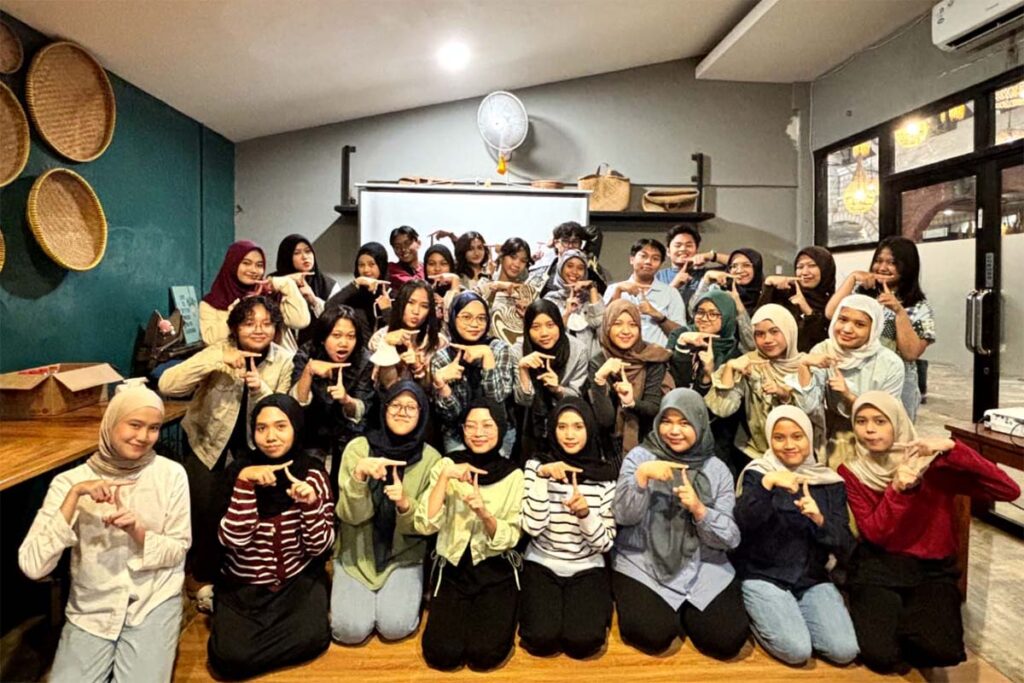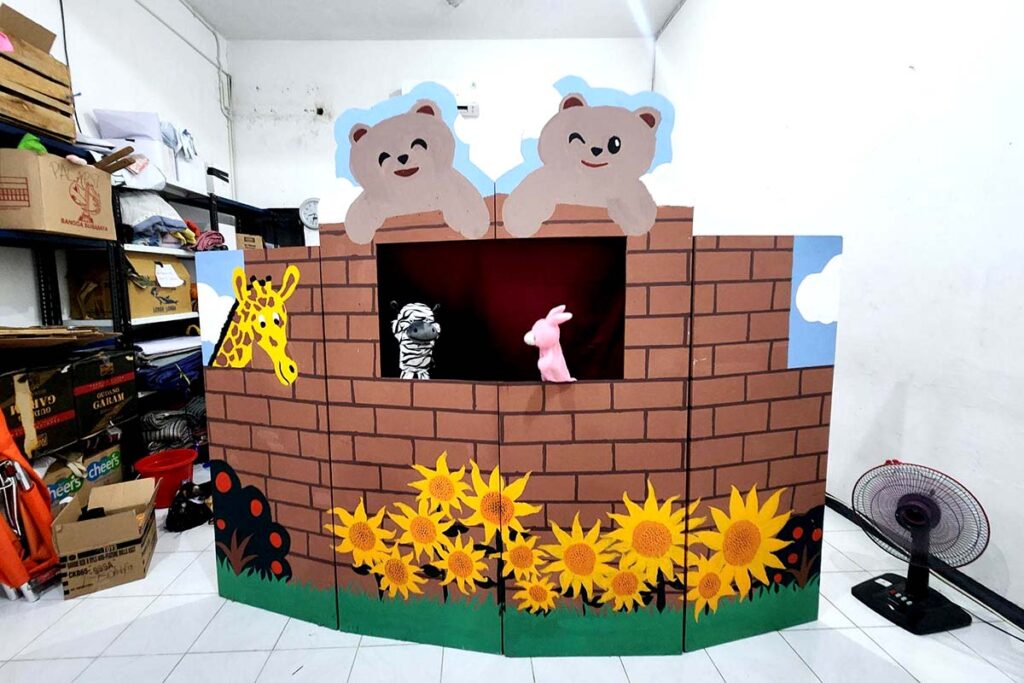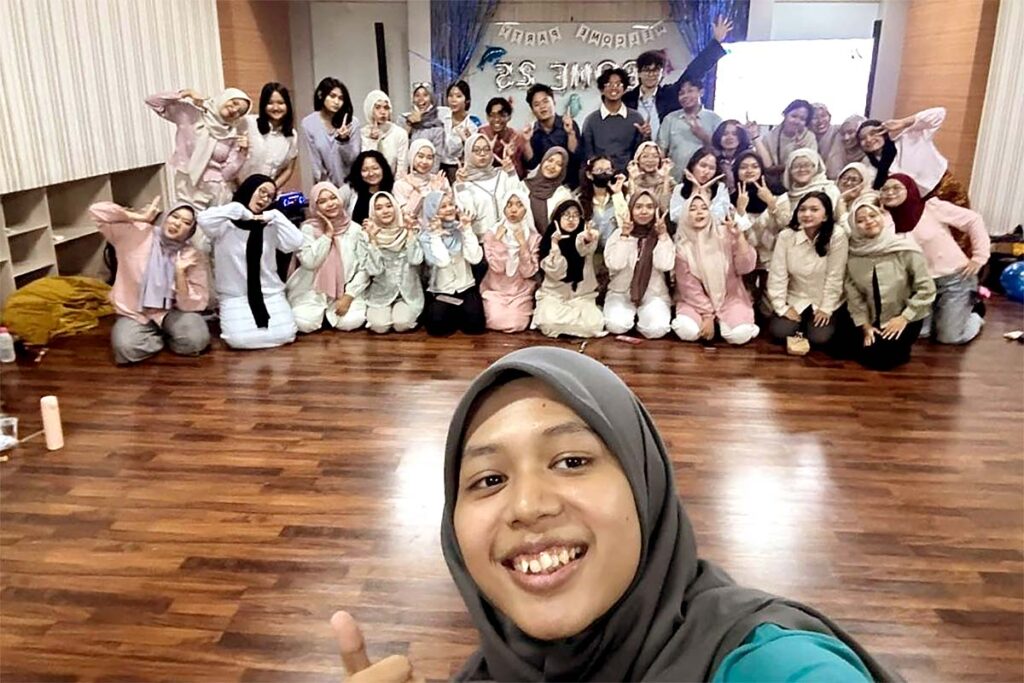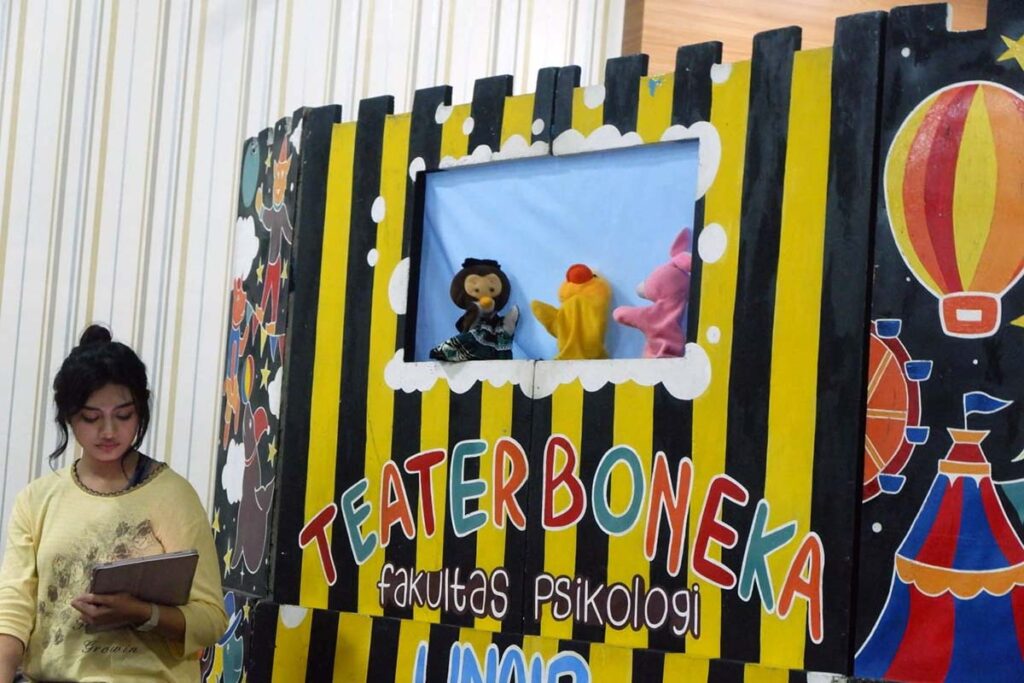
The fact that exchange Program and many other International opportunities are very beneficial for one’s life is known by everybody. But now, in the 21st century where everything has become global, International experiences like those are one of the key of becoming successful. Even though those kinds of experiences are needed, the students of the University of Airlangga have a very little interest on joining those programs. It is less than 1 percent of the total number of students in University of Airlangga that has joined all kinds of international programs. Indeed this number of interest is very low and disappointing. For that, all kinds of effort have been done by the university to raise awareness of the importance of having an international experience.
And that is why the Faculty of Psychology by the assistance of their faculty ambassador has arranged a talk show where students can increase their awareness and comprehend the many pro side of having international experiences. The event was held yesterday (12/4) in the faculty of psychology with more than 150 participants. The main speaker for the event was one of the lecturer in the faculty of psychology and also is the vice president of IOP in the University of Airlangga, Margaretha, S.Psi, P.G.Dip.Psych.,M.Sc.
Miss Margaretha herself has already been studying abroad in Australia and Dutch with scholarship, and she stated that even at first she only expected to only study there and then go back to Indonesia, she realized while being on foreign countries that it was not only about graduating and having the degree, but it was also the experience, the interaction with the native people, and also the knowledge of their education’s structure. She also reasoned that to study abroad and having international experience is to arrange our self-development to make us as a person who can face global challenges.
Miss Margaretha then shared tips on how to get those kinds of experiences; the first one was to have the will. Because having the will is the start of everything. The second one is to increase your English skill. Nowadays, it is very easy to study English even without joining courses and paying a private tutor; you can simply download apps in your phones that will teach you English and learn anywhere and any day. The third tip is to be active in searching the information of international opportunities. University of Airlangga has facilitated their student who wanted to look for international programs in the IOP (International Offices and Partnership). IOP is a department in charge of handling international programs and also international partnership. In Faculty of psychology, students can also look for information in the faculty of ambassador. These facilities have been provided by the University so what are you waiting for?
Miss Margaretha was not the only speaker in the event; there were also foreign students and Airlangga’s students especially students of faculty of psychology. The foreign students were Bo and Asri, they are respectively from Germany and Malaysia and shared fascinating stories about how they exchanged here, living here, and the cultural shock they experienced while being here. The most interesting part was the reason they choose Indonesia and exchanged here. Both of them did not really know Indonesia, Bo shared that he never went to Asian countries so he wanted to be exchanged in Indonesia and because he wanted to fund his study himself he looked for countries which has a low budget. Bo’s statement that could be underlined was that in facing his difficulties in foreign countries was “Just to jump right into it, and see what happens”. Indeed to join international programs it is very important to have the courage and just go with the flow. Meanwhile, Asri stated that he was interested to be exchanged here because he read a book about Indonesian’s history and found a quote by Imam Syafi’I that stated “Flowing water is more holy than those in idle”. His interest was piqued by the quote and so he decided to join the exchange program that University of Airlangga held.
The last session was a sharing session from students of the Faculty of Psychology of Universitas Airlangga who have experienced going abroad. The three of them were Indiraprana, Sukma and Tisha. Each of the three speakers, however, participated in different exchange or study abroad program.
Indiraprana, for instance, held an interest for educational psychology and participated in the workshop of International Student Festival in Trondheim, Norway, which she admitted to be a memorable experience. From the workshop that was managed by university students, she gained knowledge on how to manage a university event of international caliber. The workshop had inspired her to establish an international psychology conference in 2015 that was managed and supported by the students of the Faculty of Psychology of Universitas Airlangga and was known as the Psychofest International Conference.
There was a different story coming from Sukma, who participated as a team in the International Conference of Psychology in Health, Educational, Social and Organizational Setting (ICP-HESOS) in Guangzhou, China. Sukma and her team managed to participate in the ICP-HESOS after the research paper they submitted past the selection. Even though they had to face few inconvenience upon their arrival in Guangzhou, in which they had to hail a cab by themselves and had to look for a suitable hotel without any guidance, Sukma asserted that it had been an enjoyable experience that had broaden her social networking—during the prestigious occasion, she had befriended a fellow Indonesian student who pursued a study in Guangzhou.
As for Trisha who was filled to the brim with her passion for political debates, she was granted the exceptional opportunity to participate in several MUNs (Model United Nation). Her first MUN experience was on the year of 2015 in Japan, and this year, she had just participated in her second MUN this year in London, England. Getting involved in MUN had helped improved her English speaking skills and boosted her confidence in public-speaking. Trisha, however, had also once partake in a study exchange to Thailand during her high-school years.
Despite the discernibly distinct experiences the three of them might had, there was one particular subject that all of them emphasized: funding. Many students felt hesitant in going abroad in fear of not being able to afford it, however, be it Indira, Sukma or Trisha, all of them assured that money wouldn’t be that big of a problem. Students could achieve help from the faculty—from their own words, each of them did request help in funding to the faculty and the funds were immediately given in no time. There was also the option of sending proposals to companies and corporations to request for support funds. In essence, money shouldn’t be the invisible barrier standing before the students to block their path to the expansion of knowledge.
Another perturbing concern most students have over studying abroad is the likelihood of repeating a semester that they have left to study overseas—it would certainly affect the span of years spent to graduate. Miss Margaretha expressed that while it is understandable, she also stressed the importance of going abroad that would certainly be a one-of-a-kind experience that would give students additional points. Therefore, even if graduating early might give you an advantage, having an experience of studying abroad would up your ‘game’—you’d get a broader networking and more opportunities in pursuing Master’s degree in foreign university.
There might be a vast expanse of ocean that stretches between you and the rest of the world, but there shouldn’t be any excuse for not going abroad. Worried about your fluency in English? A lot of exchange students could survive with their broken English, and while it might seem nerve-racking, the best way to improve one’s language skill is to constantly converse in it. Worried about the amount of money you will have to spend? The university will certainly give you a support. If you’re assiduous enough, you may even try sending a request of financial support to corporate. Worried that you would have to spend more year(s) in your study from studying abroad? As it have been stated and emphasized by Miss Margaretha, studying abroad is a wholly different experience that will never come to you twice, so if something so priceless and scarce comes your way, you better seize it and don’t let it out of your grasp.
There is no reason for students of Universitas Airlangga to not go on a study abroad.





